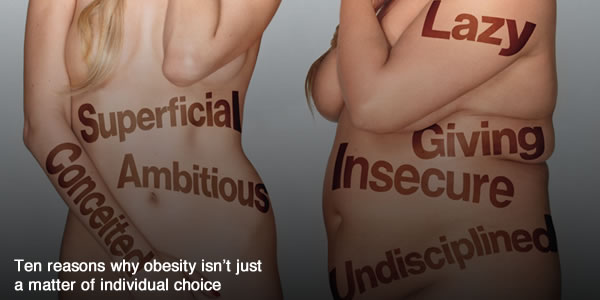The majority (90%) of Kiwis think that obesity is a matter of individual responsibility. They believe that being fat is the result of poor choices, or a lack of self-control. So the natural response to any suggestion to tax junk food is – why are you making me pay for someone’s poor choices? They should just stop being so greedy and lazy. And yet the majority of Kiwis are overweight or obese, and attempts to lose weight through diets or exercise eventually fail. Being obese is now so normal that we often fail to recognise it in ourselves and our children.
Certainly, choice or lack of self-control is one element of the obesity problem. But the latest evidence suggests that there are many reasons why it is far from the whole picture.
1.Half of Kiwis don’t understand how to eat healthily
Around of half of Kiwis don’t understand how to eat healthily. Similar numbers of people struggle to understand food labels.. For example, many people don’t understand percentages, get confused between between KJ and calories, or focus on nutritional content ‘per serve’ (which is often manipulated by the manufacturer) rather than per 100g. This figure is much higher for disadvantaged groups such as people on low incomes. How is obesity a choice if they don’t understand the implications of the food they are eating?
2. Our school system doesn’t teach kids about healthy eating
Currently our school curriculum doesn’t cover nutrition. This is seen as the role of parents, but as we saw above, many parents don’t understand the issues either, so are in no position to teach their kids’ about food. This is why Jamie Oliver has launched a worldwide campaign to teach nutrition in schools.
While schools have to offer exercise, in practice this is left to the discretion and skills of teachers. Teaching cooking skills (home economics as it was known) has in many places been switched to food technology. Little wonder then that practical cooking skills are on the wane in our younger generations.
3. It is possible to eat cheap and healthy food, but cooking skills and time are vital
These cooking skills are vital. Some complain that it is too expensive to eat healthily. This claim has been debunked – eating healthily can be cheap as long as people have the skills and time to buy and prepare foods that are in season. Junk food is often not cheaper, but it is certainly more convenient for busy families.
4. Food labeling and advertising doesn’t help the confusion
Without strong regulation, food companies will always try to portray their products in the best light possible so that people will buy them. This ‘health halo’ around some foods adds to people’s confusion over what is healthy to eat. For example ‘low fat’ claims on food convince people to eat 50% more than they otherwise would. Confused consumers are good for business, and while the Government has introduced a nutrition labelling system (the star rating) this needs to be compulsory rather than voluntary.
5. Exercise alone won’t help
It is true that with our cushy modern lifestyles we do exercise a lot less than we used to, and that contributes to our modern problems. However, exercise alone doesn’t help people lose weight – we need to control our food intake also. Otherwise the benefits of exercise tend to be offset by eating more or ‘treating’ yourself after a session at the gym.
6. 80% of attempts to diet fail
Losing weight is easy – keeping it off is much harder. Most diets fail in the long run because people don’t have the willpower to keep saying no to food when they are hungry. That is why sustainable weight loss isn’t a matter of ‘eating less and moving more’ – it is about changing the whole way we buy, prepare and eat our food.
7. Powerful hormones control hunger
The reason that so many diets fail is that powerful hormones control our hunger. That is why we eat more when we exercise! Our hormones have a ‘blueprint’ or a ‘target weight’ that they are aiming to keep our bodies at. So when people lose weight, they have to combat the hormones telling them they are hungry and need to eat more. This makes dieting hard to sustain long term, particularly when you are surrounded by cheap, convenient junk food.
8. These hormones are set by early genes & experiences
This blueprint or target weight gets set by a mixture of genes and early experiences, starting even in the womb. E.g. if a fetus is starved of the right nutrients early on, the growing body can decide that the world outside is a harsh place, so it focuses on storing fat.
9. Children who are obese are 3-10 times more likely to be obese adults
By the time a person is an adult, the impact of these genes, early experiences and habits are locked in, and it becomes much more difficult to change your weight. Not impossible – but a lot more difficult – which is why it can be far harder for some people to lose weight than it is for others.
10. In the past 40 years obesity has tripled – have our choices changed?
If obesity is a matter of individual choice, why has it ballooned in the past 40 years? Have we suddenly lost our self-control? Did we all take too many drugs in the 70s? Clearly the answer is no. So what has changed in the past 40 years that could explain the rise of obesity?
The major change in the past 40 years is that we are now surrounded by cheap, convenient, processed food – what we call fake food. These days it is much easier to eat junk food than it is to eat healthily.

